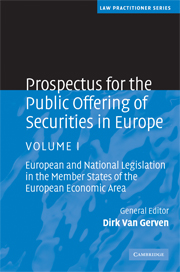 Prospectus for the Public Offering of Securities in Europe
Prospectus for the Public Offering of Securities in Europe Book contents
- Frontmatter
- Contents
- Contributors
- Preface
- Part I
- Part II Application in each Member State National reports for EU Member States
- 2 Belgium
- 3 Czech Republic
- 4 Denmark
- 5 Estonia
- 6 Greece
- 7 Hungary
- 8 Latvia
- 9 Lithuania
- 10 Luxembourg
- 11 The Netherlands
- 12 Poland
- 13 Portugal
- 14 Slovakia
- 15 United Kingdom
- Part III National reports for EEA Member States
- Part IV Annexes
- Index
6 - Greece
from Part II - Application in each Member State National reports for EU Member States
Published online by Cambridge University Press: 18 December 2009
- Frontmatter
- Contents
- Contributors
- Preface
- Part I
- Part II Application in each Member State National reports for EU Member States
- 2 Belgium
- 3 Czech Republic
- 4 Denmark
- 5 Estonia
- 6 Greece
- 7 Hungary
- 8 Latvia
- 9 Lithuania
- 10 Luxembourg
- 11 The Netherlands
- 12 Poland
- 13 Portugal
- 14 Slovakia
- 15 United Kingdom
- Part III National reports for EEA Member States
- Part IV Annexes
- Index
Summary
Introduction
General
1. Directive 2003/71 of the European Parliament and of the Council (the ‘Prospectus Directive’ or ‘Dir.’) has been implemented in Greece by way of Law 3401/2005 (the ‘Law’) on the ‘Prospectus for securities offered to the public and admitted for trading’ which entered into force on 17 October 2005. The new law repealed the pre-existing legal framework, consisting mainly of two Presidential Decrees, namely, Decree 348/1985 implementing Directive 80/390 and Decree 52/1992 implementing Directive 89/298.
In the explanatory report of the law (the ‘Ex. Rep.’) it is specifically provided that the objective of the legislator is to reinforce investor protection and to ensure market efficiency. The Prospectus Directive is characterised as an important tool for the integration of the internal market since it facilitates enterprises' access to investment capital throughout the Community. The consummation of the European capital market is further advanced through the granting to the issuers of a ‘European passport’ by way of which they will be in a position to offer their securities and to have them admitted to European Union regulated markets.
Apart from the Law, which implements the Prospectus Directive, Regulation 809/2004 (the ‘Prospectus Regulation’ or ‘Reg.’) is also directly applicable. The Prospectus Regulation provides for the specificities of the prospectus publication. For reasons of clarity specific reference is made to the Prospectus Regulation in Article 7 of the Law.
- Type
- Chapter
- Information
- Prospectus for the Public Offering of Securities in EuropeEuropean and National Legislation in the Member States of the European Economic Area, pp. 137 - 159Publisher: Cambridge University PressPrint publication year: 2008
